Hola and welcome to Where on Planet Earth! In case you got here by accident and are not yet a subscriber, sign up below! For more visuals on our travels follow us on IG @whereonplanetearth
We were in London last week admiring stolen treasures.
What I mean is that we went to the British Museum
Not really surprising once you think about it, but plenty of what is inside the British Museum was actually taken by force from its place of origin. This fact might have been discussed in hush whispers a hundred years ago, but today it’s widely acknowledged that museums all around the Western World have lots of stolen stuff on their shelves, cultural property taken without permission during colonial rule, looted during war, and then kept for hundreds of years in places far away from the people those objects mean the most to.
Although this issue is not specific to Britain, the truth is that the British Crown and the British Museum in particular are one of the most significant players in the debate. Not only the British Crown and associated private companies (i.e. East India Company) stole an impressive amount of objects from its colonies back in the day, but many of these objects remain at the British Museum to this day, even after repeated requests for their return.
The discourse around stolen treasures sitting in Western museums has certainly evolved over time. It wasn’t until the 1950s, when the reality of colonization began to be exposed, that a desire for restitution began to emerge and laws and treaties began to be put in place to facilitate this. Some of those laws are the 1954 Hague Convention (protects cultural property during armed conflict), the 1970 UNESCO Convention (allows for stolen objects to be seized if there is proof of ownership), and the 1995 UNIDROIT Convention (calls for the return of illegally excavated and exported cultural property).
You can even see this evolution in how the British Museum itself talks about the origin of the items it showcases. Whereas before the inscription of a stolen item would have boasted of imperial bravery against savages, now it tells a story of colonial violence. The Museum even has a page on their site about their “contested” objects. And to that I say: good for you, finally acknowledging reality! but so what? It all just seems shallow and superficial.
“yeah, we looted it, and we are keeping it!”, it feels like they are saying
Shockingly, there is an actual British law - the 1963 British Museum Act - that makes it illegal for the Museum to dispose of its holdings. It basically forbids the museum from removing items in its collection, regardless of the circumstances of its acquisition. Basically, it’s illegal for the British Museum to give back looted treasures to the people they were looted from; like a thief writing a law that forbids him to give back what he stole!!
Even more shockingly, in 2005 a judge actually ruled that Nazi-looted artworks held at the museum could not be returned due to this law! A few years later the Holocaust Act was put in place which now makes it legal to return Nazi-looted items, but apparently that is the line: Nazis. Anything stolen at other points in time by other bad actors still falls under the British Museum Act and cannot be returned.
The museum hides behind this act - “oh so sorry! we simply can’t return it, it’s against the law!” - as if laws can’t be changed. The Holocaust Act is a clear proof that when there is a will there is a way. But I digress…
Although laws and treaties are clearly not enough - there are still lots of looted treasures in museums - there is no denying that there has been progress made around the world. In 2017 France commissioned a report which recommended the repatriation of objects it acquired during France’s colonial past. In 2019, the German government passed a resolution on the same. In 2019, The Netherlands’ National Museum of World Cultures pledged to proactively return all artifacts that were stolen. Even other British museums, like the London Museum and London’s Horniman Museum, have returned artifacts. But, the British Museum remains largely absent from the discussion. Side note: that commissioned report by France also found that “90 to 95 percent of Africa’s cultural heritage is held outside of Africa by major museums” (!!!).
Truthfully, I found it hard to walk the British Museum halls and not wonder why the fuck were all those things still there; a loud reminder of one more thing colonization took from its subjects: Their history.
These are not just things. They are cultural treasures for regions of the world. They tell meaningful stories for entire populations. They hold legacies. They are key to the cultural and political identities of countries.
The majority of the world will never be able to go to London or Paris or New York to admire these significant artifacts, and what is even sadder is that 99% of everything the British Museum has is locked on storage so many looted items are not even on display to be admired.
In truth, I specifically wanted to see the items I knew were in dispute, as some of them had been painfully absent on our travels. Like when visiting the Acropolis museum in Athens; a place specifically built to house the findings of a single archeological site: the Acropolis. The museum is impressive, but there are clearly absent pieces of the main temple, the Parthenon. You might be tempted to think they were just lost or destroyed at some point in history - and of course some were - but *half* of everything that survived from that temple is sitting in the British Museum. And this is after more than 30 years (!) since the first formal request Greece sent asking for the permanent return of all of its Parthenon Sculptures. The British Museum doesn’t even consider these pieces as part of their “contested objects”; they say they got them fair and square, in 1800!
Honestly, even if “the British Ambassador successfully petitioned the authorities to be able to draw, measure and remove figures” more than 200 years ago, isn’t the ethical thing to do to return what you sizzled away from a historical monument all those years ago? isn’t the right thing to do to give them back to be housed in a museum that has specifically been built for them?
There are plenty of items in which the answer is a lot more clear cut. Nigeria’s Benin Bronzes, looted by British colonial troops who invaded Benin City in 1897; Egypt’s Rosetta Stone, captured in Egypt by the British army in 1801; Rapa Nui’s Hoa Hakananai’a, literally floated out in a raft by the crew of a British survey ship in 1868; all of these items were clearly taken without permission. The capture of these treasures, the subsequent denials of this fact, and the continuous requests for their return being ignored is nothing short of unbelievable and shameful.
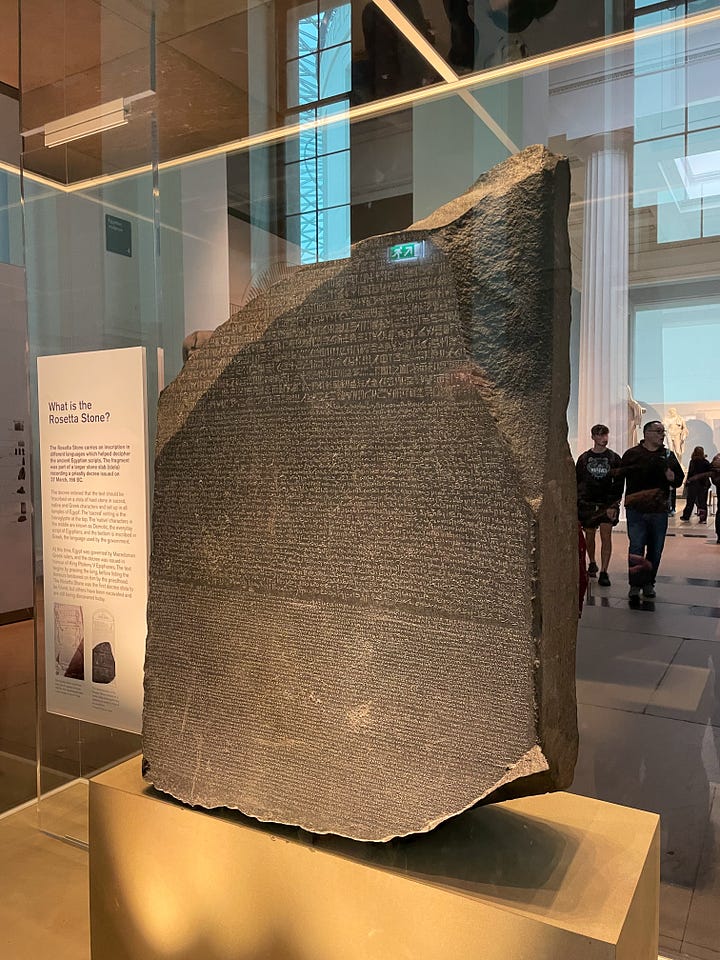

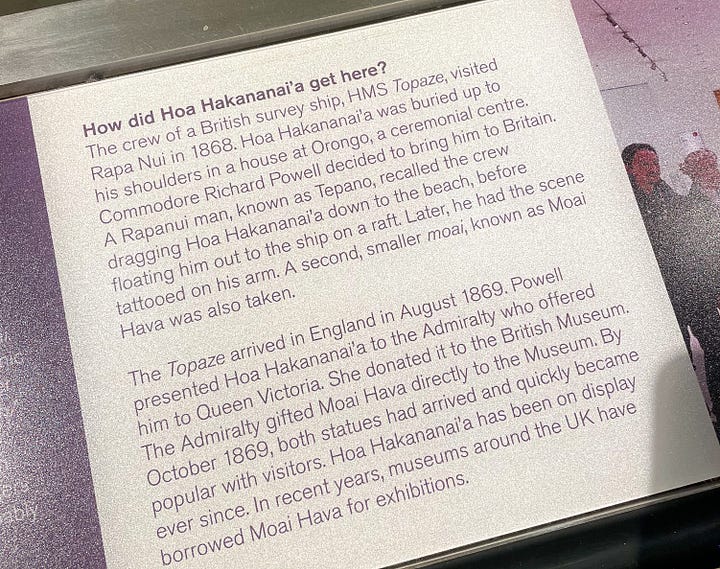
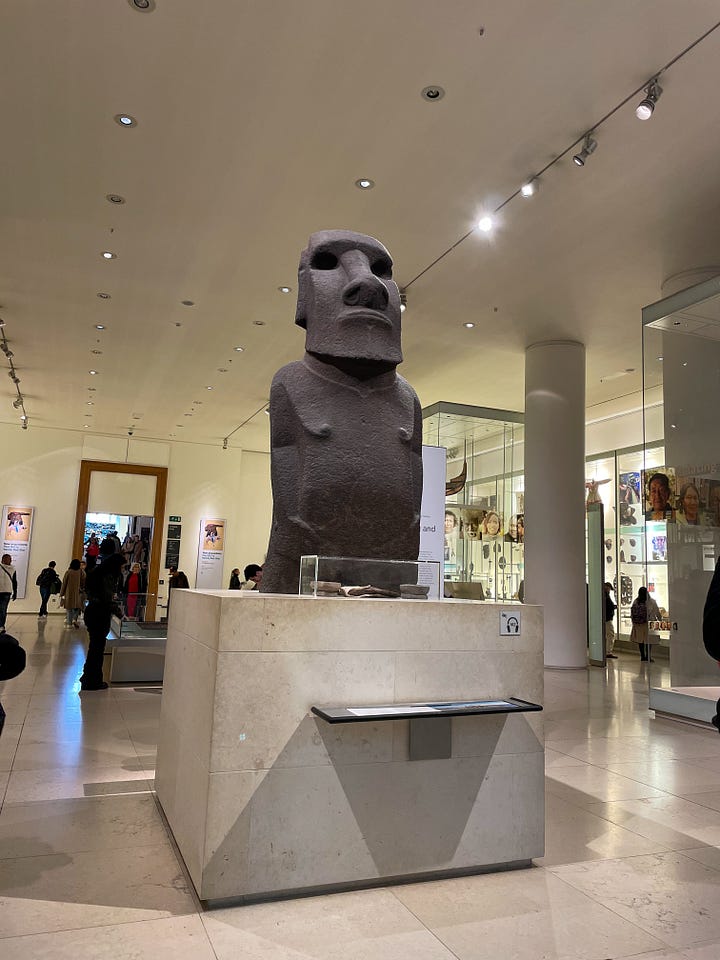
There are of course arguments against repatriation, mostly coming from the museums that don’t want to loose their stolen objects or from the citizens of the countries that hold them and don’t want their prestigious museums to be a little less prestigious.
“If they were legally obtained at the time then there is no reason to repatriate them”
This is the argument the British museum has with the Parthenon pieces (and many other items). But honestly, why does it matter what was considered “legal” at a time when a human could own another human? Obviously our attitudes about what is right and wrong have changed *a lot* in those hundreds of years, including about the ownership of cultural property, so what we do today should reflect these changing attitudes.
“If returned, these things won’t be taken care of”
Is that a valid reason for a thief to keep what he stole? The simple truth is that Britain, US, France, or Germany have ZERO say in what happens with those things once they return them because it is simply NOT THEIRS, they never were. In addition, even using that as an excuse is just colonial-mentality showing its ugly face again, the saviors complex: “you poor thing, let us take care of your stuff since you clearly can’t take care of it yourself”. What it’s even more absurd is the fact that we know that world-class museums, the British Museum included, have actually damaged pieces in their collections.
“If all museums returned what they stole then a lot of museums would be empty”
This is a false narrative as not everyone is asking for their objects back, and not everything museums have was acquired illegally; there is plenty of stuff that museums could keep showcasing. Sure, maybe the British Museum would loose some very valuable assets, but the museum would certainly survive and still have thousands of other items to showcase. Besides, there are established ways to borrow pieces temporarily.
The truth is that these arguments - and all others - are weak. We need more mature museum institutions, willing to admit mistakes and open to dialogue. We need new agreements on possession and repatriation. We need museums to stop looking the other way, shrugging their shoulders, and hiding behind outdated acts. Museums can do better.
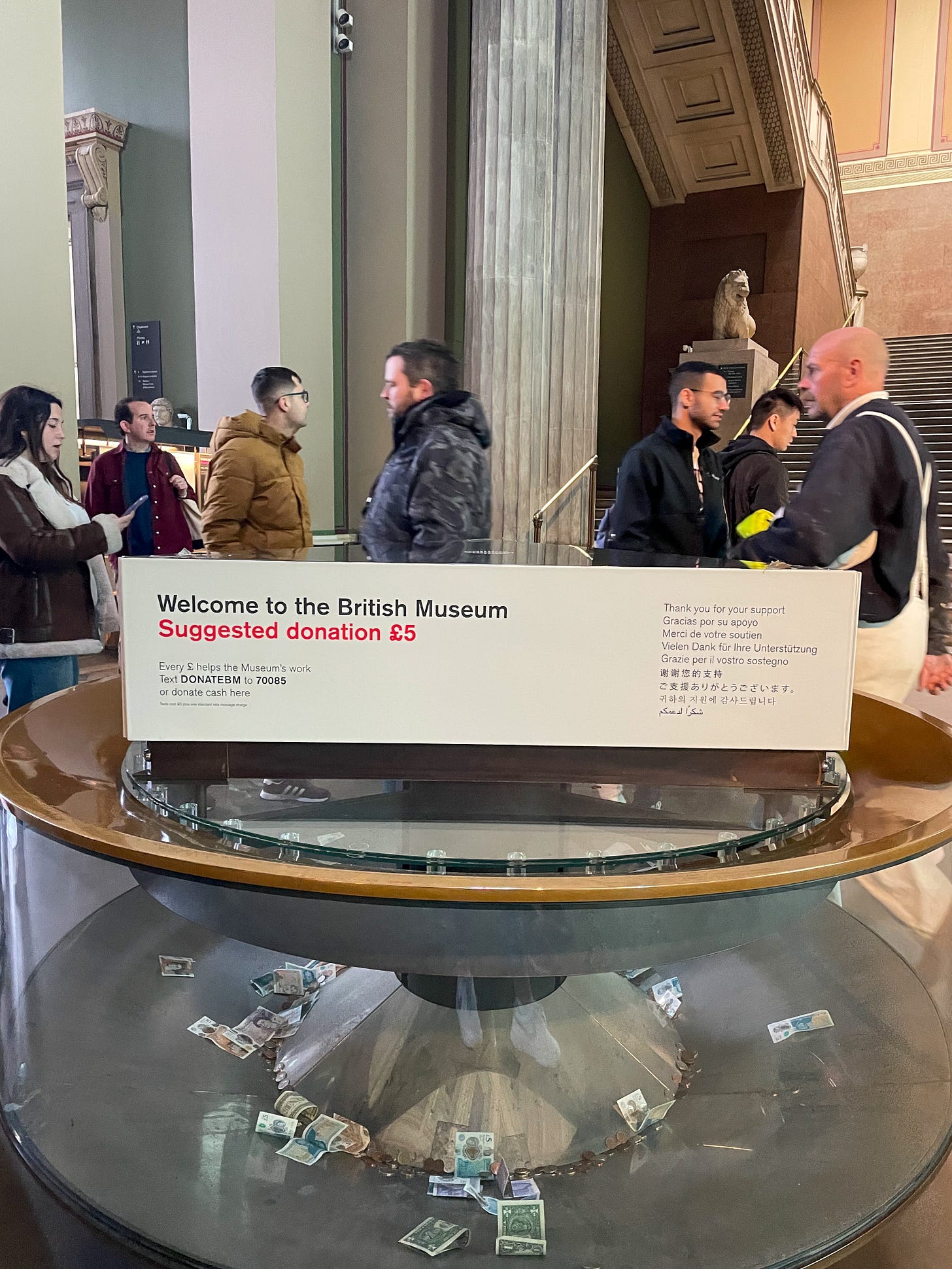
PS: there is LOTS of info about this subject on the internet, but if you are looking for an excellent summary, I recommend the “Museum” episode from Last Week Tonight with John Oliver.

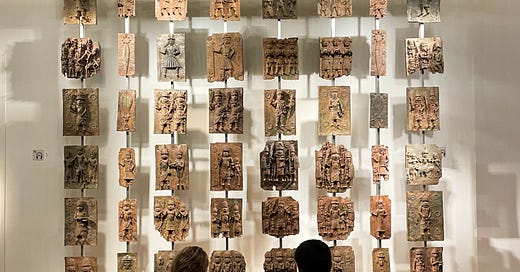



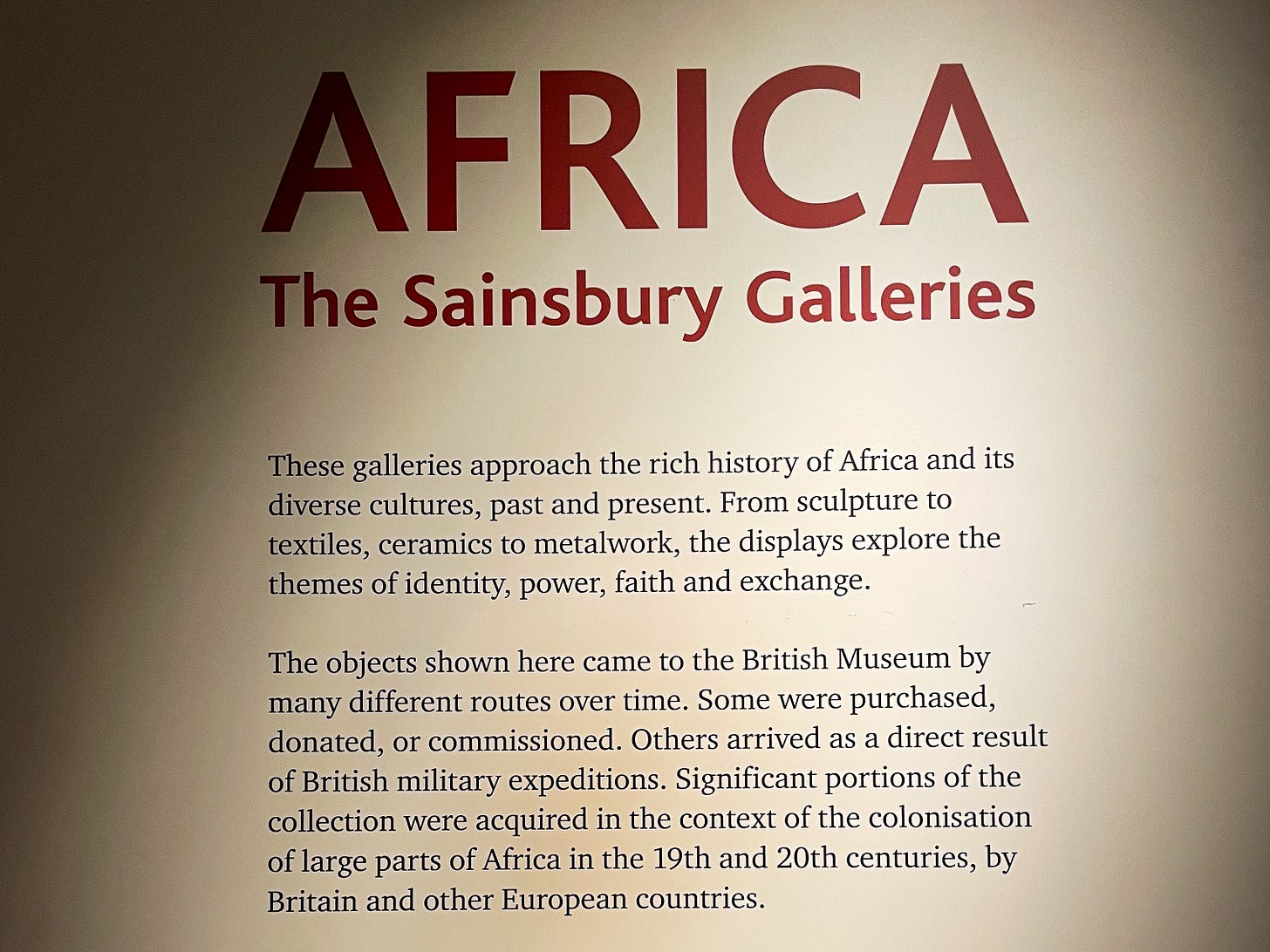
Excellent article Carla. Very good written, informative, and to the point. I completely agree with you. Museums all around the world could do a lot better regarding this issue. Thank you.